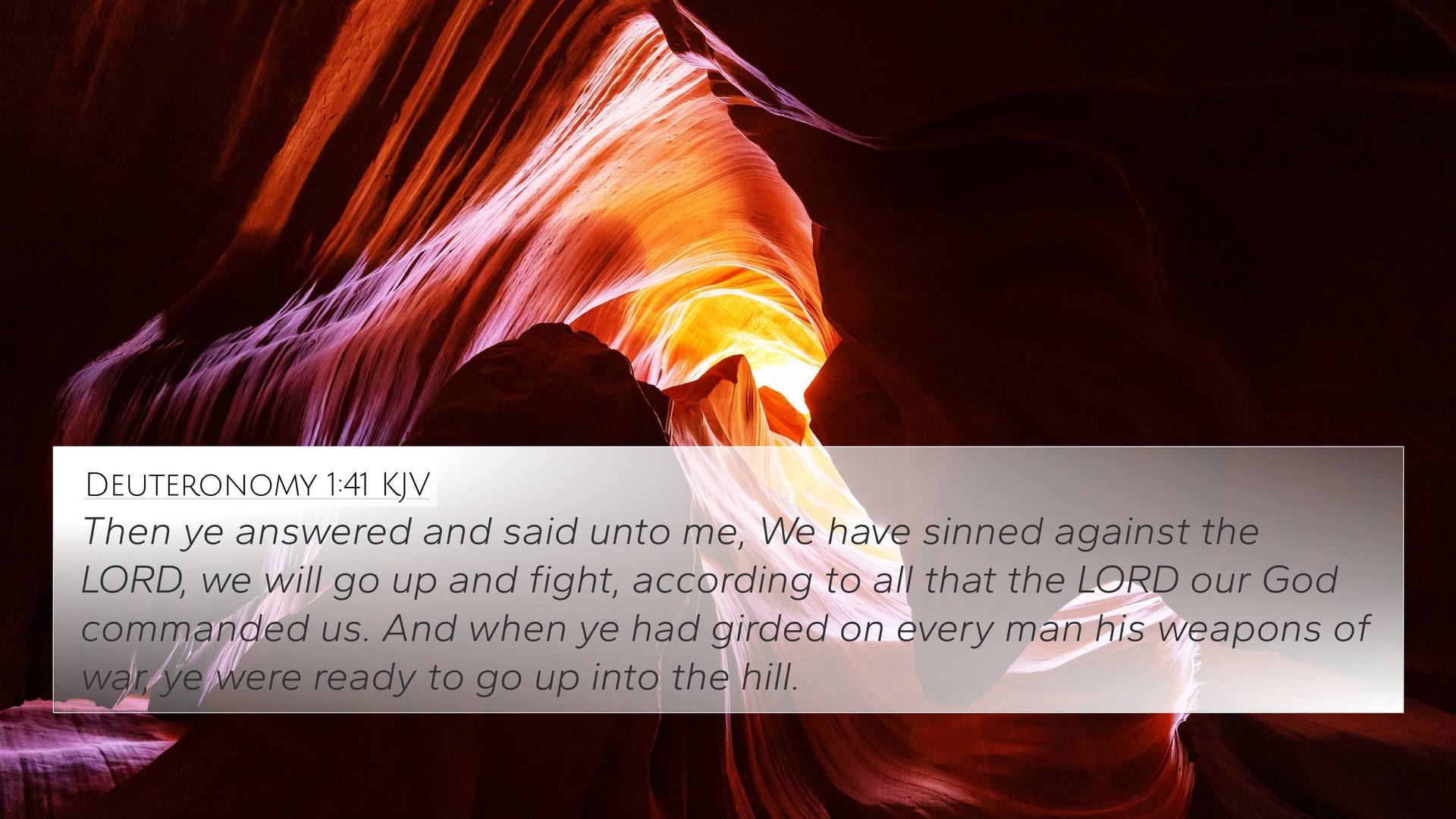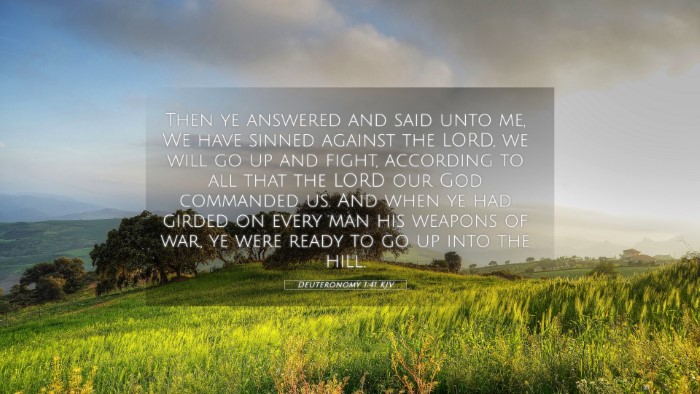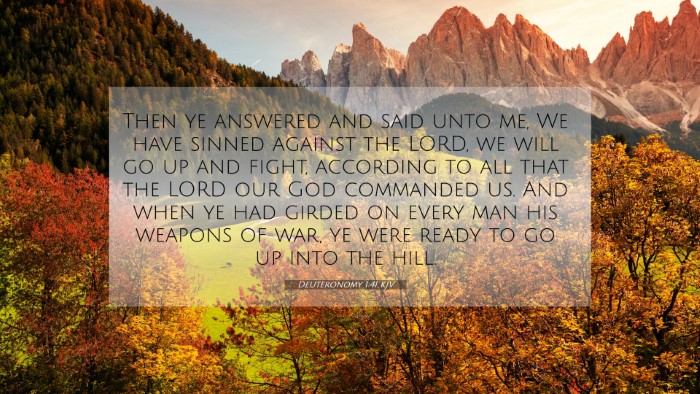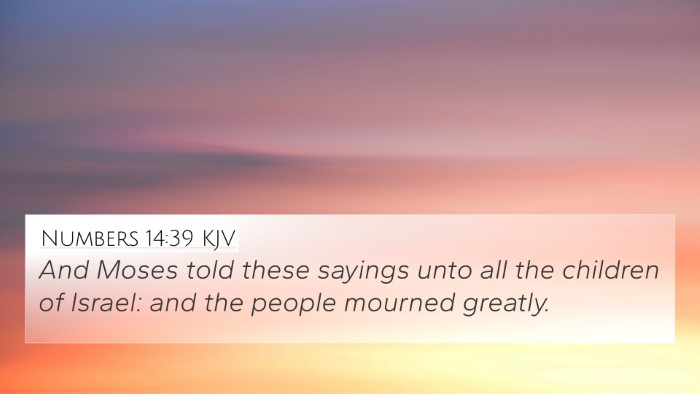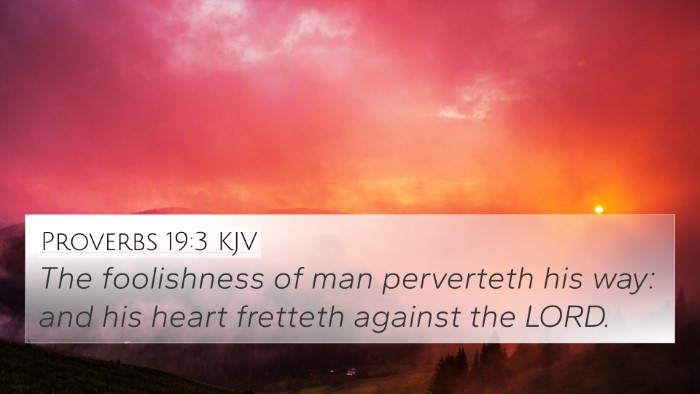Deuteronomy 1:41 - Understanding and Interpretation
Bible Verse: Deuteronomy 1:41
Verse Text: "Then you answered and said to me, 'We have sinned against the Lord; we will go up and fight, just as the Lord our God commanded us.' And when every one of you had girded on his weapons of war, you were ready to go up into the hill country."
Summary and Meaning
The verse highlights a moment of acknowledgment and resolve from the Israelites after they realized their disobedience to God's commands. They expressed a desire to repent and follow God’s instructions by preparing for battle to enter the Promised Land.
Commentary Insights
-
Matthew Henry Commentary:
This commentary emphasizes the significance of Israel’s recognition of their sin. They now understood the severity of their actions and sought to rectify their mistake by preparing for the challenges ahead. Henry draws attention to the fickleness of human resolve; their desire to go to war came after initial cowardice and doubt.
-
Albert Barnes:
Barnes points out that the Israelites' response demonstrated a form of desperation. Their initial refusal to enter Canaan when they had the chance was rooted in fear; however, after being chastised by Moses, their sudden willingness to fight underscores their shift in attitude, albeit driven by guilt and fear rather than faith.
-
Adam Clarke:
Clarke elaborates on the practical implications of this verse. He states that the preparation for battle signifies a crucial turning point for Israel, as they finally align their actions with God’s commands. However, Clarke warns that their motivation should not be out of mere fear but should stem from genuine faith and adherence to God’s will.
Bible Verse Cross-References
Deuteronomy 1:41 closely relates to several other Scripture passages, creating a web of understanding and encouragement for readers:
- Numbers 14:39-45: The Israelites' regret and their attempt to fight after Moses' warning.
- 1 Samuel 15:30: Demonstrating how repentance must be genuine, differing from mere remorse.
- Hebrews 11:30: Faith in action and the importance of following God's commands in the face of challenges.
- Joshua 1:6-9: God's encouragement to be strong and courageous when entering the Promised Land.
- Deuteronomy 31:6: A call to be strong and courageous based on God's presence with His people.
- Isaiah 30:15: The importance of returning to God for strength and salvation.
- Romans 8:31: Encouragement of God’s support in times of conflict.
Thematic Bible Verse Connections
This verse encapsulates the broader themes found throughout Scripture, including:
- Repentance: The Israelites’ acknowledgment of sin and desire to correct their path is seen throughout the Bible, from David’s recognition of his sin (Psalm 51) to the New Testament calls for repentance (Acts 2:38).
- Courage and Faith: As seen in Joshua's leadership and exhortations, the Bible frequently calls for courage in the face of fear.
- Obedience to God’s Command: This principle is foundational in the narrative of Israel, as illustrated in Exodus 19:5 and Matthew 7:21.
Inter-Biblical Dialogue
The connection between Deuteronomy 1:41 and other biblical texts creates an inter-Biblical dialogue that encourages believers to examine their own hearts and actions. This dialogue emphasizes:
- The necessity of genuine repentance (2 Corinthians 7:10).
- The readiness to follow God's directives even amid fear (Philippians 4:13).
- The understanding that God’s grace is available for those who seek it earnestly (James 4:8).
Conclusion
Deuteronomy 1:41 serves as a profound reminder of the human condition — the need for repentance, the temptation to act without true conviction, and the divine call to courageously follow God's commands. By exploring this verse through various commentaries and cross-referencing it with biblical texts, readers can deepen their understanding and appreciation of God’s faithfulness and the importance of aligning their lives with His will.
